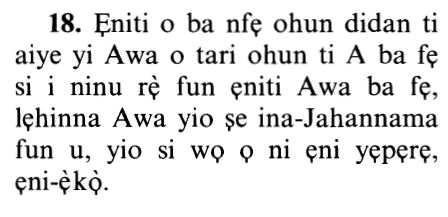17vs18
Select any filter and click on Go! to see results
مَّن كَانَ يُرِيدُ الْعَاجِلَةَ عَجَّلْنَا لَهُ فِيهَا مَا نَشَاء لِمَن نُّرِيدُ ثُمَّ جَعَلْنَا لَهُ جَهَنَّمَ يَصْلاهَا مَذْمُوماً مَّدْحُوراً
Man kana yureedu alAAajilata AAajjalna lahu feeha ma nashao liman nureedu thumma jaAAalna lahu jahannama yaslaha mathmooman madhooran
Index Terms
Click to play
Yoruba Translation

Hausa Translation
Wanda ya kasance yanã nufin mai gaggãwa,(1) sai Mu gaggauta masa a cikinta, abin da Muke so ga wanda Muke nufi, sa´an nan kuma Mu sanya masa Jahannama, ya ƙõnu da ita, yanã abin zargi kuma abin tunkuɗewa.
Asbabu n-Nuzuul (Occasions of Revelation)
The Reward of Those who desire this World and Those who desire the Hereafter
Allah says:
مَّن كَانَ يُرِيدُ الْعَاجِلَةَ ...
Whoever desires the quick-passing (transitory enjoyment of this world),
Allah tells us that not everyone who desires this world and its luxuries gets what he wants. That is attained by those whom Allah wants to have it, and they get what He wills that they should get.
This Ayah narrows down the general statements made in other Ayat.
Allah says:
... عَجَّلْنَا لَهُ فِيهَا مَا نَشَاء لِمَن نُّرِيدُ ثُمَّ جَعَلْنَا لَهُ جَهَنَّمَ ...
We readily grant him what We will for whom We like. Then, afterwards, We have appointed for him Hell;
meaning, in the Hereafter,
... يَصْلاهَا ...
he will burn therein,
means, he will enter it until it covers him on all sides,
... مَذْمُومًا ...
disgraced,
means, blamed for his bad behavior and evil deeds, because he chose the transient over the eternal,
... مَّدْحُورًا ﴿١٨﴾
rejected,
means, far away (from Allah's mercy), humiliated and put to shame.
يخبر تعالى أنه ما كل من طلب الدنيا وما فيها من النعيم يحصل له بل إنما يحصل لمن أراد الله وما يشاء وهذه مقيدة لإطلاق ما سواها من الآيات فإنه قال " عجلنا له فيها ما نشاء لمن نريد ثم جعلنا له جهنم " أي في الدار الآخرة " يصلاها " أي يدخلها حتى تغمره من جميع جوانبه " مذموما " أي في حال كونه مذموما على سوء تصرفه وصنيعه إذ اختار الفاني على الباقي " مدحورا " مبعدا مقصيا حقيرا ذليلا مهانا . روى الإمام أحمد حدثنا حسين حدثنا دويد عن أبي إسحاق عن زرعة عن عائشة رضي الله عنها قالت : قال رسول الله صلى الله عليه وسلم الدنيا دار من لا دار له ومال من لا مال له ولها يجمع من لا عقل له .
"من كان يريد" بعمله "العاجلة" أي الدنيا "عجلنا له" التعجيل له بدل من له بإعادة الجار "ثم جعلنا له" في الآخرة "جهنم يصلاها" يدخلها "مذموما" ملوما "مدحورا" مطرودا عن الرحمة
يعني الدنيا , والمراد الدار العاجلة ; فعبر بالنعت عن المنعوت .
I'raab - grammatical analysis of the Qur'an
«مَنْ كانَ» من اسم شرط جازم في محل رفع مبتدأ الجملة استئنافية.
«كانَ» فعل ماض ناقص واسمها محذوف.
«يُرِيدُ» مضارع فاعله مستتر.
«الْعاجِلَةَ» مفعول به والجملة خبر كان.
«عَجَّلْنا» ماض وفاعله والجملة لا محل لها من الإعراب لأنها جواب شرط لم تقترن بالفاء.
«لَهُ» متعلقان بعجلنا.
«فِيها» متعلقان بعجلنا.
«ما» اسم موصول في محل نصب مفعول به.
«نَشاءُ» مضارع فاعله مستتر والجملة صلة.
«لِمَنْ» اسم موصول والجار والمجرور متعلقان بنشاء.
«نُرِيدُ» مضارع فاعله مستتر والجملة صلة.
«ثُمَّ» عاطفة.
«جَعَلْنا» ماض وفاعله والجملة معطوفة.
«لَهُ» متعلقان بجعلنا.
«جَهَنَّمَ» مفعول به.
«يَصْلاها» مضارع مرفوع بالضمة المقدرة على الألف للتعذر وفاعله مستتر والها مفعول به وجملة يصلاها في محل نصب حال.
«مَذْمُوماً مَدْحُوراً» حالان.
